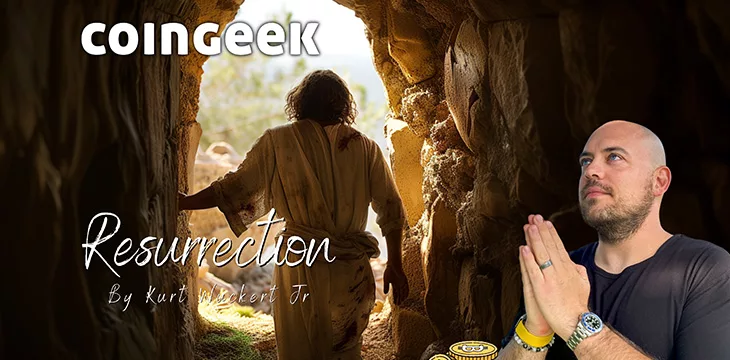|
Getting your Trinity Audio player ready...
|
As we enter the solemn and reflective period of Good Friday and the jubilant celebration of Easter Sunday, we’re reminded of the profound narrative of sacrifice, defeat, and ultimate victory over the seemingly insurmountable, the most insurmountable foe: death.
But death is only the consequence of the real foe: the unstoppable nature of time. We fight time and seek eternity for ourselves, our ideals, or our memories, something we can only hope to pass on through our children or perhaps our legendary accomplishments as individuals. But in death, we cease to be, and we die completely when we cease to be remembered or have influence on the world, unless we have invested into the eternal. This narrative, central to Christian theology, speaks volumes not just of spiritual rebirth but also of the inevitable unfolding of destiny against all odds.
Good Friday commemorates the crucifixion and death of Jesus Christ—a moment that seemed to signify defeat. The Jewish and Roman authorities grew tired of the disruptive nature of the man from Nazareth, freeing people’s minds, forgiving people’s sins, and healing the sick. If the people had direct access to God, what was the need for the Pharisees, Sadducees, and the entire religious hierarchy? If he freed people from their fear of death, what could the Romans leverage against Israel to keep them under control? They publicly executed Jesus of Nazareth in hopes of extinguishing Christianity in the cradle, but that was merely the prelude to the most significant event in the Christian faith: the resurrection. On Easter Sunday, Jesus conquered death, affirming the unstoppable power of destiny and the divine plan set in stone with the Adamic Covenant so many generations earlier and fulfilled through the seed of David, through the tribe of Judah. But this is not a Christianity 101 article.
This is CoinGeek!
Being a BSV advocate has felt a lot like being a martyr for the last few years. Hated by the small blockers, hated by the mainstream, mocked for believing Bitcoin was always scalable and uninvited from all the seats at the high table. But we persist because we believe Bitcoin was always supposed to be for more than just obtaining more wealth and more power. We want to operate the timechain! We want the things of value to be widely distributed, easily written, and easily accessed so that the truth can never die!
We believe that to preserve the truth immutably over time will grow and harvest more freedom!
Jesus’ story of overcoming adversity, and perhaps even death, through faith and the fulfillment of destiny resonates deeply with the current trajectory of BSV. Much like the skepticism and challenges Jesus faced, BSV has navigated through criticism and doubt from all angles. The mainstream narrative around the popular digital currencies, particularly Bitcoin and its derivatives, often mirrors the roles of Caiaphas and Pilate—figures of authority from Judaism and the Roman government who underestimated the power and inevitability of what was to come.
The resurrection of Jesus is not merely a tale of spiritual significance; it is a metaphor for the inevitable rise of phenomena that, though initially resisted, are destined to transform the landscape. In this light, the resurgence of BSV is not a matter of if but when. As we embrace the season of rebirth, BSV stands on the brink of baffling its critics, much like the astonishment that followed the empty tomb.
BSV is controversial for a great many reasons, but the greatest reason is the fact that it is the only implementation of Satoshi’s Vision of Bitcoin, and that makes it far more powerful than the critics can comprehend. As much as Jack Dorsey and his ilk think they can crush the BSV community like the authorities of Rome and Jerusalem thought they could crush the Christians, they are in for a heck of a surprise.
Critics and skeptics, much like the authorities of old, may flex their might, resisting the tide of change. Yet, history and faith teach us that the true course of destiny cannot be halted. It moves with the unstoppable momentum of a stone rolled away from a tomb entrance by the angel of the Lord, especially since those who believe in the power of BSV are so clearly not motivated by the allure of fiat profits over the value of the system itself. This is what so ruthlessly baffles the small blockers in their quest for fiat money and power, and it is our greatest strength.
In this season of renewal, let us reflect on the power of rebirth and the inevitable nature of progress and innovation. The resurrection of BSV is at hand, poised to arise and redefine the narrative, much like the dawn that broke on the first Easter morning when Jesus Christ defeated death.
As we contemplate the lessons of Good Friday and Easter, let us carry forward the spirit of renewal, resilience, and the unwavering belief in the inevitability of destiny. The resurrection of BSV is not just a possibility; it is a destiny waiting to manifest, mirroring the eternal message of hope and rebirth that Easter brings to us all.
May God bless us all.
Watch: Most people don’t understand Bitcoin

 08-01-2025
08-01-2025 




